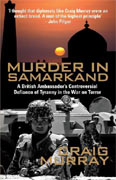Suomen ja Yhdysvaltain suhteet ovat kaikilla tasoilla normaalit ja ongelmattomat, kuten maailman ainoan supervallan kanssa pitääkin olla, mutta liittolaissuhteesta ei ole kysymys. Riittää, että johtajat tuntevat toisensa ja voivat tarvittaessa hoitaa yhteyksiä ja asioita suoralla kanssakäymisellä. Varmaan kanssakäymistä olisi enemmän, jos Suomi olisi liittynyt Irakiin hyökänneeseen koalitioon tai tarjoaisi amerikkalaisille tutka-asemia ja sotilastukikohtia Suomessa, mutta onneksi näin ei ole.
Siksi olen kokenut jonkinlaisen aikakone-elämyksen lukiessani hulluimpia kommentteja joidenkin suomalaisten poliitikkojen USA-suhteista ja Helsingin Sanomat jopa laskenut, miten paljon ”Bush-pisteitä” Tarja Halonen on presidenttikaudellaan kerännyt. Aikakone-elämyksen siksi, että tämä muistuttaa lähes yksi yhteen elämää muinaisessa YYA-Suomessa, jossa pidettiin kirjaa valtiojohdon sekä yksittäisten poliitikkojen ja puolueiden neuvostosuhteista, niiden tiheydestä, laajuudesta ja tasosta. Ero on ehkä siinä, että toistaiseksi ei ole havaintoja siitä että matkailun kohde olisi pyrkinyt hyväksikäyttämään. Sekin aika voi tulla jos sitä näin tarjottimella tarjotaan.
Kun johto jommassa kummassa maassa vaihtuu, on luonnollista, että he kohtuullisen ajan sisällä tapaavat toisensa, sekä valtionpäämiesten että ulkoministereiden kesken. Kun hallitus Suomessa on vaihtunut niin on paikallaan että uusi ulkoministeri käy Washingtonissa tapaamassa USA:n virkasisartaan. Ilkka Kanervan nelikymmenminuuttinen tapaaminen Condoleezza Ricen kanssa näyttää sujuneen nuottienmukaisissa merkeissä, ja hyvä niin.
Kun itse tulin ministeriksi vierailin tasavallan presidentin mukana Washingtonissa, jossa tapasin silloisen ulkoministeri Madelaine Albrightin. Sama toistui kun Yhdysvaltain ulkoministeriksi tuli Colin Powell ja kun hän vaihtui Riceen. Muutoin olen tavannut heitä lukemattomien moninkeskeisten kokousten yhteydessä. Suomen EU-puheenjohtajakaudella oli seitsemän sellaista 4 – 40 delegaation yhteiskokousta, jossa keskustelimme samassa pöydässä. Toisin kun Ilta-Sanomat toistelee meidän puhe- tai muissakaan väleissämme ei ole ollut erityistä ongelmaa silloinkaan, kun olemme nähneet asiat vähän eri tavoin.
Suomi ja Yhdysvallat ovat monissa tärkeissä perusasioissa samanmielisiä valtioita ja mekin olemme solidaarisesti mukana kansainvälisessä kriisinhallintayhteistyössä sekä toiminnassa terrorismia vastaan. Siihen liittyen ei ole tarvis korostaa eroavaisuuksia saatikka elämöidä niillä, mutta ei niistä myöskään pidä vaieta. Ihmisoikeuksien ja oikeusvaltioperiaatteiden kunnioittaminen ovat tinkimättömiä perusarvoja, mutta sen lisäksi on nähtävä, että niiden loukkaaminen terrorisminvastaisessa työssä ei tuota toivottua tulosta vaan päinvastoin vahvistaa ääriliikkeiden, fundamentalismin ja terrorismin kasvualustaa. Tätä yleensä eurooppalaisia yhdistävää näkemystä on korostettava myös transatlanttisissa suhteissa.
 Kun reaalipolitiikka voittaa ihmisoikeudet
Kun reaalipolitiikka voittaa ihmisoikeudet